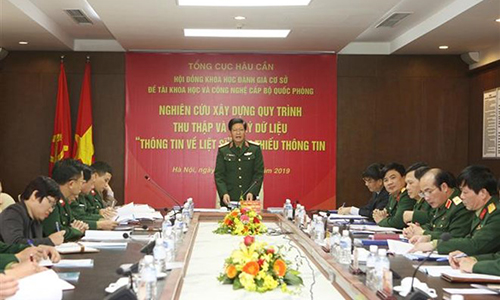Ministry builds process to support identification of martyrs' remains
ABO/VNA – The Ministry of National Defence is carrying out a project to build a process collecting and handling data on martyrs who lacked information.
 |
| Major General Nguyen Xuan Kien, head of the Military Medical Department and head of the project’s Scientific Council, speaks at the meeting (Photo: VNA) |
The Policy Department under the General Political Department of the Vietnam People’s Army and the Military Medical Department under the General Department of Logistics convened a meeting to assess the implementation of the project in Hanoi on January 5.
At the event, Major General Nguyen Xuan Kien, head of the Military Medical Department and head of the project’s Scientific Council, said the project is one of the four contents of a larger project on building processes to identify remains of martyrs who lacked information hosted by the Military Medical Department in collaboration of the Military Forensic Department and the Policy Department.
The three other contents are processes to collect samples, determine genes and build software to handle information on fallen soldiers who lacked information.
To date, the project has basically been completed and may be taken over at grassroots-level. After that, a defence ministry-level take-over report will be completed so that the project is applied widely across the country, contributing to identifying remains of martyrs.
Major General Tran Quoc Dung, head of the Policy Department and chairman of the project, said this project came from the significance and importance of the identification of remains of fallen soldiers who lacked information and the current management of martyrs’ graves in the country.
Other members of the council assessed that the implementation of the project is extremely urgent and necessary to serve the identification of remains of martyrs who lacked information, meeting the aspiration of their relatives and contributing to creating socio-political stability and a momentum for the current national construction and defence.
During more than half a century of struggling for national independence, construction and defence, and doing international missions, nearly 1.2 million officers, soldiers and people sacrificed their lives. To date, units and localities nationwide have found and repatriated about 900,000 remains.
According to data, among 871,373 fallen soldiers’ graves in martyrs cemeteries across the country, only 15,493 have full information.
(Source: VNA)
.
 về đầu trang
về đầu trang






